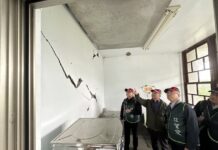Taiwan Church News
3336 Edition
February 1 – 7, 2016
Headline News
Nuclear Energy Is Never The Answer To Climate Change Crisis
Reported by Chen Yi-fan
Few days ago, people seems got excited chasing around the snow-falling sites in Taiwan. As a matter of fact, behind this hilarious wonder of snow-falling on this semi-tropical island subsists a serious crisis of climate change. To understand the major causes of global climate change and why nuclear energy should be strictly banned as an option in Taiwan’s substitutional energy policy, a seminar entitled “2016 Environmental Education Workshop On Climate Change” is held at Kaohsiung’s Villa Garden and jointly organized by two citizen groups both Mom Loves Taiwan and Citizen of the Earth.
Dr. Gloria Kuang-rung Hsu, an atmosphere science professor of National Taiwan University, and Prof Tim Mousseau, a biology professor of South Carolina University, are specially invited to deliver their thoughts.
In her opening speech, Ms Young Sun-mei, general secretary of Mom Loves Taiwan, mentions that climate change is deeply connected with our ecological carbon output. But Taiwan government could never deliver an effective answer on carbon reduction except by telling people to switch off light or fast water faucet. In the meantime, nuclear energy has never been a solution to reduce carbon among the international society, for once any nuclear disaster happened it is beyond human’s capability to handle it.
Prof Gloria Kuang-jung Hsu points out straightly that the problem of climate change is actually the problem of energy use. Taiwan government should stop boosting people to switch off light, plug off cable or riding the bicycle, says Hsu, instead a concrete carbon reduction project, following Paris agreement at COP21 and upgrading the energy efficiency of the industries, is the best way to survive the climate crisis ahead.
Based on his long term comparison studies of two desolate power plants at Chernobyl and Fukushima, Prof Tim Mousseau stresses the radiation’s permanent damage over the biosphere. As a matter of fact, Mousseau says, current meltdown ratio of nuclear power plants, i.e. the three most utterly destroyed ones – Fukushima, Chernobyl and Three Miles Island – compared to global 6,000 more nuclear power plants, is alarmingly high.
Except that the nuclear wastes of most nuclear power plants are very difficult to handle, the radiation of those nuclear waste water is also very high and tough to deal with, says Mousseau. In his study of Chernobyl, Mousseau finds the birds inhabiting near the desolate power plant always grow to be infertile, get tumors and have gene deformation in their brains and eyes. Even the fir tree, which should be grown straight, has a very crooked outlook under the damaging radiation after the melt down of Chernobyl nuclear power plant. Biodiversity never comes back in these traumatized areas under nuclear radiation, says Mousseau.
Translated by Peter Wolfe

Prof Tim Mousseau, a biology professor of South Carolina University, stresses the radiation’s permanent damage over the biosphere.

Speakers of “2016 Environmental Education Workshop On Climate Change”, held on 27 January 2016 at Kaohsiung’s Villa Garden, includes Dr. Gloria Kuang-rung Hsu(left most), an atmosphere science professor of National Taiwan University, Ms Young Sun-mei(center), general secretary of Mom Loves Taiwan and Prof Tim Mousseau, a biology professor of South Carolina University.
Photos by Chen Yi-fan






